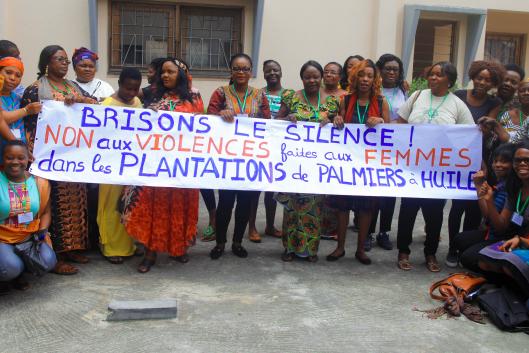Download the declaration (pdf)
“Yesterday is gone, live today wisely and since tomorrow cannot be assured,
the struggle starts now…” Hajaratu Abdulahi from Nigeria
No to abuse against women in industrial oil palm plantations
We said it in Mundemba, Cameroon, we reiterated it in Port Loko, Sierra Leone, we re-affirm this in Abidjan, Cote d'Ivoire: the abuse against women in and around industrial oil palm plantations must STOP!
We, community-based, national and international organisations involved in the struggle for the rights of women in rural communities in West and Central Africa, signatories of this declaration, met at the CERAO in Abidjan, from 10 to 14 August 2018.
After our field visit to the village of Tiegba, in the sub-prefecture of Guitry, and hearing stories and experiences faced daily by women who live in and around industrial oil palm plantations in different African countries, we stand with our sisters to denounce and break the silence about the different forms of violence and abuse that take place in and around the industrial plantations.
We heard touching testimonies of women:
- who are arrested for picking up even only a few nuts in the plantations;
- for whom neo-colonialism persists in the form of industrial plantations or customs that deny women (equal) access to family land;
- suffering under curfews imposed by oil palm plantation companies that limit freedom of movement; as a result, our sisters have been losing their babies because they could not access hospitals after curfew;
- who cannot make public cases of violence and abuse that take place in and around the industrial plantations or even under their own domestic roofs.
We also heard testimonies about agreements signed between planters growing oil palm under contracts and oil palm plantation companies that are illegitimate and which ensure all the benefit is with the companies.
We do not need to remind you that women on the African continent and, indeed the rest of the world, are the custodians of seeds and a diversity of farming practises; the nutritional value of their families rests with women, and they are always at the forefront of the struggle against poverty, through their many interventions, especially in the field of agriculture and food.
The deliberate promotion of monocultures and land policies that do not adequately involve women allow for land to be grabbed and rob women of their responsibilities of caring for their families and the land that provides for their families' needs. Monocultures kill the fertility of the soil, compromise biodiversity, pollute water sources, lead to loss of traditional knowledge, cultural and agricultural practices and decimate non-timber forest products that are an important source of income for women. Industrial plantations can never replace forests nor feed families the way women do with their family agriculture; in fact, they are a threat to the food sovereignty of rural communities.
We further denounce that industrial monoculture plantations, and particularly those of oil palm:
- plunge women living in and around industrial plantations into deep poverty;
- push communities, and women in particular, to submit themselves to the neocolonialism of palm oil companies’ industrial plantations;
- lead to the disappearance of traditional oil palm which has a wide variety of uses (medicinal, nutritional, cultural), provides economic independence to women and is valued by women for its contribution to the well-being of their families and communities.
We demand:
- that the expansion of industrial plantations stops;
- that men and women are ensured equal access to their land to cultivate and harvest;
- negotiations on land acquisition that are inclusive, transparent and which involve women directly in the decisions made that affect their land;
- denunciation at all levels of cases of rape and any other form of violence against women in and around industrial plantations;
- sustainable family farming that protects ecosystems and generates income for women in peasant farming communities;
- future generations inherit a fertile, healthy, diverse continent that we are proud of.
Enough is enough, we can no longer allow ourselves to be prisoners on our own land. We are available and capable to champion the cause that leads to reclaiming our land and protecting our biodiversity.
Women, women, women! Power, power, power!
Femmes, femmes, femmes! Pouvoir, pouvoir, pouvoir!
Abidjan, 14th August 2018
Signed by:
- Youth Volunteers for the Environment - Ivory Coast
- Youth Volunteers for the Environment - Ghana
- Synaparcam (Synergie Nationale des Paysans Et Riverains du Cameroun) – Cameroon
- Network of Actors for Sustainable Development (RADD by its French acronym) - Cameroon
- RIAO – RDC
- CDHD – Congo
- CAMESP - Liberia
- Reseau des femmes braves - Ivory Coast
- Muyissi Environnment – Gabon
- COPACO-PRP (Confédération Paysanne du Congo-Principal Regroupement des Paysans) - RDC
- CNOP (Concertation Nationale des Organisation Paysanne et Producteur Agricole du Congo) - Congo
- ADAPPE Guinée (Association pour le développement et la protection de l'environnement en Guinée)
- Maloa Association – Sierra Leona
- Culture Radio – Sierra Leona
- Community Forest Watch - Nigeria
- Yethio Community - Côte d'Ivoire
- COFESATSA - Ivory Coast
- ERA (Environmental Rights Action) – Nigeria
- NRWP (Natural Resources Women Platform) – Liberia
- GRAIN
- WRM
